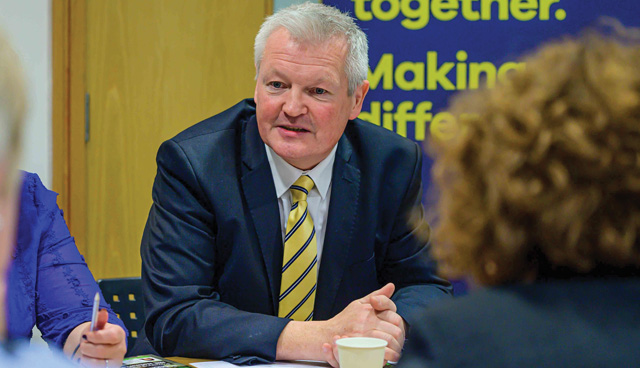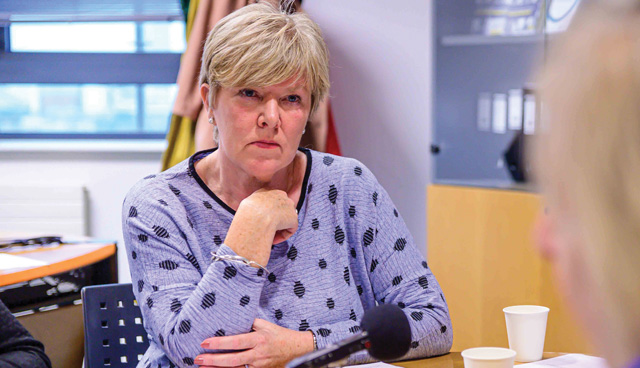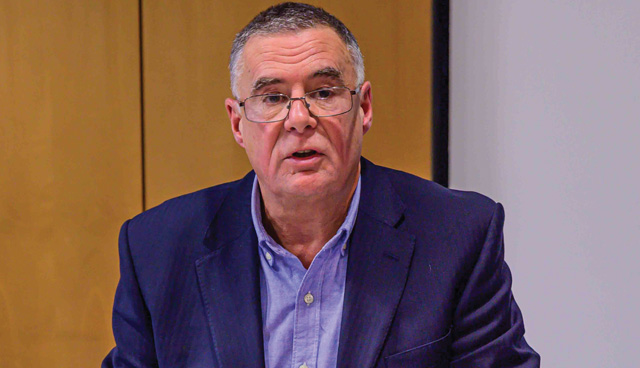Reform of adult social care

Northern Ireland Social Care Council hosted a round table discussion with key stakeholders around the reform of adult social care.
Why do we need reform of the adult care system and what are the challenges to delivering that transformation?
Marie Heaney
Adult social care as a concept is relatively new and widely misunderstood. The necessity for reform is well documented, we have an ageing population and are also in a time of demographic transition and society is still exploring the opportunities and challenges of later life. There continues to be an over reliance on institutional models of care including hospitals and care homes. We have deepening inequalities in Northern Ireland. A key reason for reform is to recognise the impact on family carers who are facing a negative impact on their health and wellbeing. We’ve made significant strides in recent decades but the system needs to address more urgently the impact the demographic changes are having on the current system.
Marian O’Rourke
The need for reform is about our recognition, as a society, of what social care can mean. There is a massive opportunity in reform to shift the focus on wellbeing to a whole-person approach. It’s also about we, as a society, being better able to articulate what good social care should look like. If a person-centred approach is the premise on which we want to move forward, then the system has to change to accommodate that. The introduction of registering and regulating the social care workforce has been a fantastic opportunity to look at making sure that we have common standards, shared values and are moving towards consistent qualifications. The system is diverse but we have to have consistency in delivering a diverse range of care.
Pauline Shepherd
The need for reform arises out of the fact that the current system is not working and there is insufficient capacity to meet demand. Domiciliary care is currently not sufficient and if we want to keep people out of hospitals then we need to invest more in keeping them in their own homes. We currently don’t have the workforce to meet demand and it’s not an attractive career. If we want to reduce the cost of health for older people we need to invest more in our social care.
Stephen Mathews
A clinician recently described to me the “tyranny” of acute demand in the winter pressures challenge and the impact that has in drawing resources away from social care. It’s an indication of the short-termism that we constantly deal with and we desperately need to move beyond that and look to long-term sustainability in the broader social care system. The ‘Power to People’ report focussed on citizenship – enabling people to exercise their rights and their expectations – and having control over those. Recognising individual responsibility but putting the structures and support services in place to reflect that is how we should be shaping our services.
Seán Holland
The number of people who require support to live is growing and people want to be in control, to shape their own lives and have their rights respected. I think the key challenge is understanding that social care is actually the solution to that problem, it isn’t a problem in itself. People still think about spending money on social care as a burden cost. It’s not, it’s an investment in enabling people to lead the life that they deserve.
Jackie McIlroy
Good social care should be about improving the quality of life. Why should we change the policy? Well, our current policy was created in the 1990s and it’s well overdue a change. Public expectation has changed dramatically. ‘Power to People’ talks about giving people more control over the decision-making around their care but there is no point giving people control if we don’t give them a choice about what that care looks like. I think we have to find a more diverse range of providers and supports that people can access in many different ways.

Declan McAllister
As decision makers, we need to create sustainability within social care and that must be centred on an understanding of what our citizens require. We have identified the pressures, so we must inform, educate and prepare for how we deliver social care into the future. Innovation will play a big part in this. Digital technology can help us support a future-proofed service but we must put citizens at the very heart of that design with an outcomes-based approach.
Where should reform be focussed? How important is additional resource and is there scope for innovation in delivery?
Jackie McIlroy
The reality is that the level of funding we require for reform will probably never be available, so we need to be creative and innovative. Technology will play a role but so too will different models of care and support mobilisation, within communities and family groups. We should also be looking elsewhere for exemplars of social care delivery.
Marie Heaney
Developing and sustaining neighbourhood networks of social care are a key aspect of transformation. Treating social care as a discharge pathway from hospital creates base short-termism and further reliance on beds. Local social care enterprises have the potential to be an economic driver and increase skills providing a future pathway to skills development for wider economic and societal benefit.

Pauline Shepherd
Even with the right model and funding, my biggest concern is where are we going to get the workforce from? Demand for care is increasing but the number of people seeking a career in the sector is very low. I worry we are not doing enough to attract young people.
Marian O’Rourke
We also need to ensure we are getting the right people. People who are coming into the sector because it’s their chosen career as opposed to a stop gap or a step to something else. Very few people have career ambitions to be a social care worker today and we need to change
that through a visible career progression structure.
Stephen Mathews
We’ve identified the challenges but we need to enact change and the starting point for reform has to be the social care workforce. You can’t deliver reform if you haven’t got the right people in the right place and I think fundamental to attracting and retaining those people is a long-term career structure. That pathway needs to be well publicised and visible. However, there also needs to be a sense of urgency around this and investment to support it.
Declan McAllister
We need to invest smart. The current model of social care delivery is not sustainable over the next decade due to changing demographics, but there is an opportunity to utilise innovation to enable our highly skilled social care staff to deliver high quality social care. We need a value-based approach to bringing the right people in to social care and a clear career pathway is important to achieve a sustainable workforce.

Seán Holland
I see challenges to be addressed in both supply and demand. On the supply side, we have a crisis in the supply of a workforce to deliver social care. However, I’m more optimistic than most because we recognise the problems and are addressing them. Creating pathways and recognising social care as a unique discipline in the near future will help. Also, digitalisation will impact on a lot of career pathways but less so on social care where the focus is primarily on relationships. I would hope that social care will become a more attractive career prospect as the general workforce transitions. Another supply is the fragile market place. We’re in a situation where we are dependent, especially in some sectors, on some very large and removed providers. Some of these have failed and we have to ask if this is the right market to ensure supply. Maybe small and local isn’t something we have focussed on enough.
On the demand side, we have to do more in the area of prevention to reduce the levels of demand on social care. Also, we need to find out what social care is working. Not all social care is created equal. We have had some catastrophic failings in social care in the last year and we need to start thinking beyond quality regulation to better models of delivery.
Pauline Shepherd
We’re at the point where there needs to be a discussion with the public on how we are going to fund adult social care going forward. If we just keep looking at the same pot of money, then we’re not going to meet the requirements. That will need political intervention and unfortunately, that’s not available currently.
Do we have a workforce equipped to deliver reform? How can they be further supported?
Seán Holland
We get phenomenal value from the current workforce who do outstanding work. I don’t think there is any sector where you get better value from £1 of public money. Fundamentally, there are a lot of young people who want to work with people, however, we have to ensure that they can afford to work in the area of social care and that a decent career is on offer. We need to value the work done under challenging conditions more than we currently do. I don’t think it’s necessarily useful to talk about it being a profession because the span of the skills needed are too broad but recognising it as a discipline will be a positive.
Marie Heaney
Providing social care requires a lot of emotional labour. Social care workers deal with illness, death and other hardships on a daily basis and they usually don’t get sufficient support to process the emotional issues providing care can evoke. I think there needs to be greater clarity around who delivers social care and ensure that it is a distinct and valuable discipline in its own right. There is confusion within the public and we create that by not clarifying what social care is and what its values are. There is a need for a refreshed model of regulation which focuses more on service improvement and support.

Stephen Mathews
The ‘Power to People’ report used the phrase “care work is highly skilled. To be good at it you need to have emotional intelligence, negotiation skills and kindness in spades”. There must be a recognition that we’re expecting some of the lowest paid workers in any workforce to deliver within a regulatory framework that is challenging. The expectations, from medication management through to managing challenging behaviours, are huge and yet we have expectations that those workers should fully appreciate, understand and deliver services in this context. We’re often not paying people enough to reflect that level of responsibility or we’re not giving them enough support, institutionally, to recognise it.
Declan McAllister
I believe social care should have a vision towards professionalism. It might not happen in the coming years, but I see good reason to aim for it in the long-term. Firstly, because we are able to reflect on nursing and the huge strides that have been made through professionalisation since the 1950s. Secondly, I believe that status is important. If we have a vision to move social carers into that multi-disciplinary approach for outcomes delivery then they should be able to be on a level playing field with colleagues within health and social care and recognised for their unique skills and knowledge. If we want to see defined pathways to social care work – separate from nursing and social work – then we should be encouraging professionalism and a defined career pathway.
Pauline Shepherd
I agree. I think the lines are blurred between social care and health care, particularly in the area of domiciliary care. Lack of investment means that only those with the most complex needs are actually receiving domiciliary care, which means that a lot of social care workers are now dealing with things that used to be reserved for a district nurse. We’ve made the job more complicated and complex without reflecting that. I also think that there are benefits to be had from having those people going through professional pathways into other areas of care contributing to social care in their qualification and education.

Marian O’Rourke
Investments from the transformation fund, albeit limited and short-term, offer a glimpse of what might be possible. 98 per cent of those on the frontline of adult social care, who have had the opportunity to have enhanced training within their work context have told us that it has made a real difference to their knowledge, skill and ability to deal with complexities. The workforce is hungry to learn and work differently but there is a challenge in enabling employers to support up skilling and learning and development, as part of the day job. The ‘what works’ approach to reform is key to actually changing the current landscape.
Jackie McIlroy
Despite the many challenges facing social care. Public perception is positive and they value the workers within it. That’s because workers are making a difference to people’s lives and they should be supported to do that.
Marie Heaney
I believe one of the reasons behind that is because they are not professionals. They are not conditioned by regulatory frameworks and so can form emotional relationships in care delivery. Professionalisation can sometimes disconnect workers from empathy but people respond to kindness.
Discuss the importance of collaboration and partnerships in change. Is there a greater role for the independent, voluntary and community sectors?
Stephen Mathews
There has been a lot for transformation of services in the third sector that is not funded by health and social care but is having a direct impact on health indicators and the population. When you look at the breadth of work being carried out, it’s important to not lose sight of what works and works well. A holistic approach to transformation is necessary and I think there is a responsibility across government. Given the broad range of funding attributed to the draft Programme for Government’s approach to better outcomes, joined-up commissioning is important.
Declan McAllister
I think we’re at a point of looking at the relationship between commissioner and provider, whether that’s statutory or non-statutory, and moving to establish better outcomes for our citizens. I believe there is too much resource being pushed in to monitoring, figures and returns and not enough focus on delivering those outcomes for citizens. How that approach will be procured will be a challenge, but it can’t continue to be this run to the bottom, lowest price approach. The focus must be on quality of service delivery rather than time and task.
Pauline Shepherd
Partnership progress and collaboration has been achieved around things like new models of care but where I see that approach not working is when a patient is moving between sectors. Currently, it’s a handover approach. However, a person should have the same support throughout their social care and a provider switch should be invisible to them. A wrap around system needs to be in place for each individual receiving care.
Seán Holland
Commissioning for outcomes is certainly the desired direction of travel. We currently have a brutal and simplistic approach where we buy time or a bed and that doesn’t reflect the complexity of the task or how people want to live their lives. This approach must change and the importance of continuity of responsibility needs to be recognised. We need to experiment or pilot different models which place quality above price. It might work, it might not, but it’s worth trying. Finally, I would add that the greater role is actually probably required for the statutory sector when it comes to adult social care. A large amount of work in this area is done outside of the statutory organisations and I think that leaves us vulnerable to market changes and doesn’t reflect the stratification of need.

Marie Heaney
Public services remain siloed at a strategic level. I think there is a case for councils, housing, and trusts to work more like local authorities in Great Britain at a strategic planning as well as operational level.
Seán Holland
Good examples of partnerships exist locally. The Children’s sector has been transformed over the past decade through a broad range of collaborative arrangements. I think a similar approach to partnership arrangements, way beyond health and social care, is needed for Northern Ireland.
Jackie McIlroy
Giving more control back to individual and using self-directed support in an enhanced way, as recommended by ‘Power to People’ would change the model that we provide for in communities. It has done so in other parts of the UK where social enterprises and co-operatives, for example, are collaborating with the social care sector. We haven’t even started that journey yet and we need to be more creative if we are to do so. This would change the dynamic within communities and we need to support implementation if we are serious about early intervention.
Marian O’Rourke
Engaging with the community and getting a better connection between the conversations that are happening is important. Here in the Social Care Council we support the Leaders in Social Care Partnership and this is a first step in bringing the diverse range of providers around one table. However, even these relationships take time to develop trust, openness and collaboration. A further step that we need to take is understanding what is happening at a very local level within communities. There are structures out there we are not tapped in to.
Stephen Mathews
You will reap considerable benefits around longer term sustainable outcomes for individuals if you invest in supporting Social & Community Networking services. Identifying things like leisure provision, peer networking and support and independent travel training impacts across all programmes of care.
Identify one immediate priority for reform in the short-term?
Declan McAllister
Something that has struck me more recently is around the communication of the matter of social care and the language we use in reflecting it to wider society. Recently there has been almost a competition for crisis within our overarching health system, not just social care, and I think that breeds a fatalism to the point where the public know that change is required but see no potential solution to the challenges. We’re also paternalistic in looking to government to solve these challenges and yet a return to community focused care may be the culture change required. Why aren’t we more collective and co-productive when we design social care services?

Jackie McIlroy
Support for informal carers. Currently, we rely on families to provide the majority of care to an individual and that won’t change going forward. So, how do we better support them to do this? Proposed legislation will help but I don’t think it’s a silver bullet. It’s important that we pay as much attention to their wellbeing as to the person they are caring for and we can put those supports in place now.
Seán Holland
For me, it’s co-production. We need to stop talking about it as some abstract term and start commissioning services that are co-produced. That is services developed in true partnership with the people going to be using those services. A transparent service, where power rests with the service user. Also, co-produced services would be fundamentally safer.
Stephen Mathews
Workforce development. At the heart of transformation is the enacting of that aspiration to value the workforce.
Pauline Shepherd
As well as the workforce, I would point to the various good practices across the health trusts that, through lack of collaboration, are not being replicated wider. I believe there should be a forum or an authority to implement successful models of care across the board.
Marian O’Rourke
A critical group within the workforce are the frontline managers. If we can support them in their role then we can achieve real change because they are pivotal in terms of that connection to the staff who deliver care.
Marie Heaney
Have the public conversation about social care. There continues to exist misunderstanding about what it is, what it costs and what it could be. A well designed and properly resourced public conversation, as well as potentially a citizens’ forum, would be welcome. Successive governments have failed to crack the challenges of delivering comprehensive social care but the public carers and service users can cut through the complexities. A conversation will help shape investment priorities, achieve a status for social care in the public eye and eventually provide a mandate for government.
Participants
Marie Heaney
Marie was appointed to the Director of Adult Social and Primary Care post at Belfast Health and Social Care Trust on 1 October 2017. She previously was Co-Director in Older People and Physical Health Disability and Sensory Services and has held a number of posts in service delivery service development and strategic planning.
Seán Holland
Séan is Chief Social Work Officer/Deputy Secretary over Social Services Policy Group in the Department of Health. He qualified as a social worker from Ulster University in 1986 and is a qualified Social Work practice teacher and has a LLM in medical law. Previously, he held the post of Chief Social Services Officer in 2010.
Stephen Mathews
Stephen is the Chief Executive of The Cedar Foundation. Stephen was appointed OBE in the 2010 Birthday Honours for services to people with a disability, he was appointed to the Equality Commission as a Commissioner in 2019.
Declan McAllister
Declan is Director of Registration and Corporate Services at the Northern Ireland Social Care Council with 25 years’ experience in the Health Service. He is a Psychology graduate from Queen’s University Belfast with a Masters in Information Management. He previously held a senior role with the Northern Ireland Guardian ad Litem Agency before taking up his current post in 2017.
Jackie McIlroy
Jackie is Deputy Chief Social Work Officer and has almost 30 years’ experience as a Social Worker, mostly in Statutory Mental Health Services. She joined the Department of Health as Professional Lead for Mental Health and Learning Disability in 2013, and was a member of the Regional Review of Commissioning in Northern Ireland.
Marian O’Rourke
Marian is the interim Director of Regulation & Standards in the Northern Ireland Social Care Council. A qualified social worker, Marian is responsible for leading on the development of the social work and social care workforce of over 40,000 registrants across Northern Ireland. She works with the Council’s Leaders in Social Care Partnership.
Pauline Shepherd
Pauline has been CEO for the Independent Health and Care Providers, a not-for-profit membership organisation representing the non-statutory care home and domiciliary care sector, since 2014. Her career includes working at CEO, Executive Director and non-executive director level across a range of organisations in the public and voluntary sectors. She is a qualified HR professional and member of the Institute of Directors.





